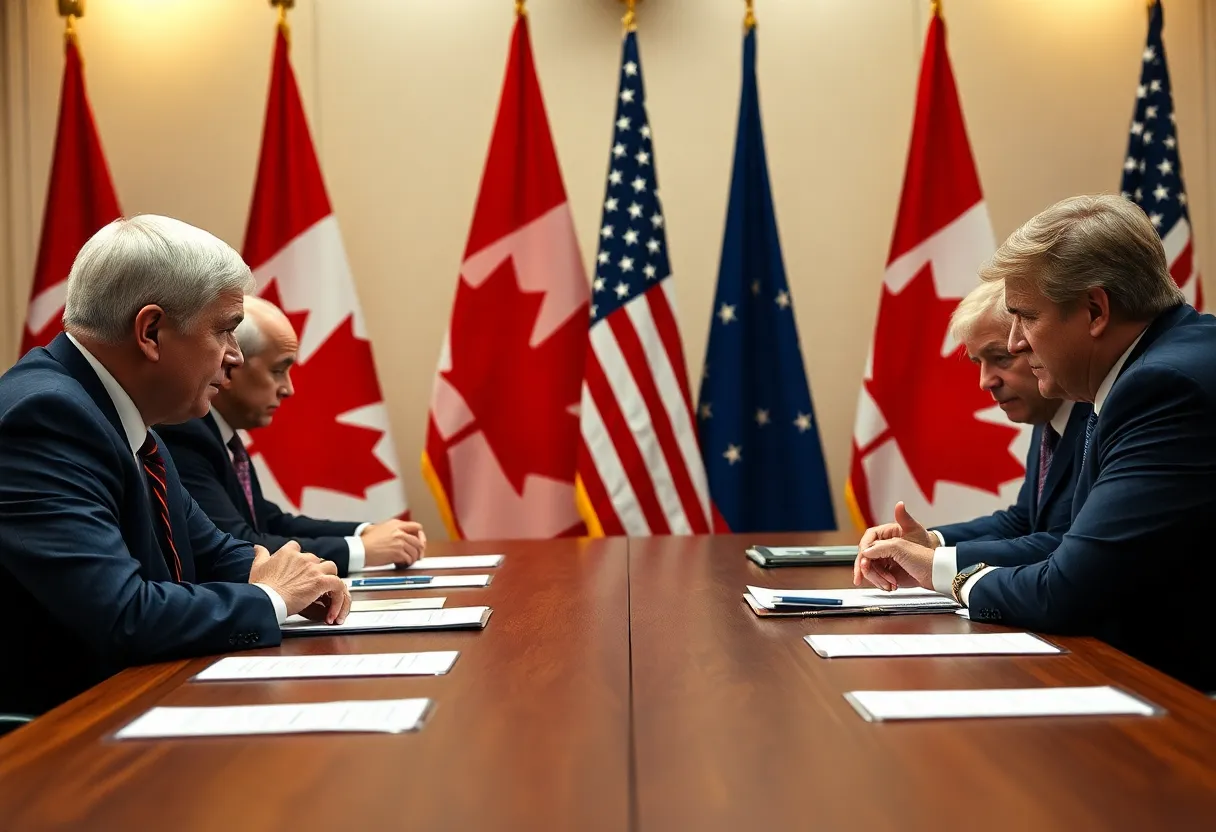

Canadian leaders strategizing on how to handle potential U.S. tariffs.
Tensions rise between Canada and the U.S. as Prime Minister Justin Trudeau prepares for a potential 25% tariff war that could severely impact the Canadian economy. With economists warning of significant job losses and GDP reductions, Canadian leaders are exploring countermeasures while facing internal divisions on energy strategies. As the political landscape shifts, the implications of this trade conflict extend beyond borders, raising concerns about inflation and consumer prices in both countries.
It seems things are heating up between Canada and the U.S. as Canadian leaders, including Prime Minister Justin Trudeau, are preparing for a potential 25% tariff war that could significantly impact the economy. During a recent meeting with provincial and territorial premiers, Trudeau proclaimed that under no circumstances is “nothing off the table” when it comes to responding to these tariffs. With about 75% of Canada’s exports heading south of the border, the stakes couldn’t be higher.
Economists have raised some alarms over this potential trade conflict, suggesting that Canada’s GDP might plummet anywhere from 1.8% to 5.6% as a direct result of these tariffs. That could mean serious repercussions for employment, with provinces like Alberta potentially facing the loss of 50,000 jobs. Meanwhile, Ontario’s auto sector could experience a staggering 500,000 job losses. That’s a lot of families who could be feeling the pinch.
The Canadian government is taking proactive measures. Officials are gearing up with countermeasures and are looking into retaliatory tariffs on specific U.S. products such as orange juice and steel. With the uncertainty surrounding U.S. President-elect Trump’s plans, Canadian leaders are striving for a coordinated response to safeguard Canadians’ interests. This situation isn’t just black and white, as there are internal divisions on energy strategy among the provinces. Trudeau, alongside his counterparts from Ontario, Quebec, and Newfoundland, seems willing to explore the possibility of utilizing energy exports as a form of counter-tariff.
However, not everyone is on the same page. Alberta’s Premier Danielle Smith stood her ground, opting out of the joint statement, firmly opposing the idea of using energy export tariffs as retaliation. This disconnect raises questions about the cohesiveness of Canada’s response to potential tariffs from the south.
While the political landscape is shifting, it’s important to remember that these trade tensions are part of a larger strategy. Trump has indicated that these tariffs are designed to not only protect jobs but also to generate revenue for the U.S. In a roundabout way, he believes tariffs could benefit the American economy. Both Canadian and U.S. experts have voiced concerns that a tariff-induced trade war could drive inflation and consumer prices higher in the U.S., making life a bit pricier for everyday Americans.
Canadian legislators are hard at work, lobbying their U.S. counterparts, urging them to reconsider the proposed tariffs. The potential fallout from this tariff war complicates an already tenuous environment, especially with Trudeau indicating plans to step down after the upcoming Liberal leadership race in March. This hints at a shakeup that could shift Canada’s approach to U.S. relations moving forward.
As Canadian leaders unite under the banner of defending their economy, the overlying question remains; how will this all pan out? The potential for a tariff war may indeed alter the fabric of U.S.-Canada relations, touching key industries such as oil and automobiles. With provinces eager to push back but disunited on energy policies, the situation is precarious. The coming weeks and months will reveal not just the fate of trade agreements, but also the common ground—if any—that can be forged between these neighboring countries.
News Summary Ashley Nicole Cromer, a 39-year-old from Gaffney, SC, pleads guilty to a serious…
News Summary On April 24, 2025, Elgin, South Carolina experienced a 2.3 magnitude earthquake at…
News Summary Local businesses in Charleston, SC are struggling with soaring liquor liability insurance rates,…
News Summary The University of South Carolina proudly announces that its International MBA program has…
News Summary In April, Columbia, South Carolina, is championing sustainability as Duke Energy pledges $375,000…
News Summary On April 23, Newberry celebrated its annual Rotary Club golf tournament at the…